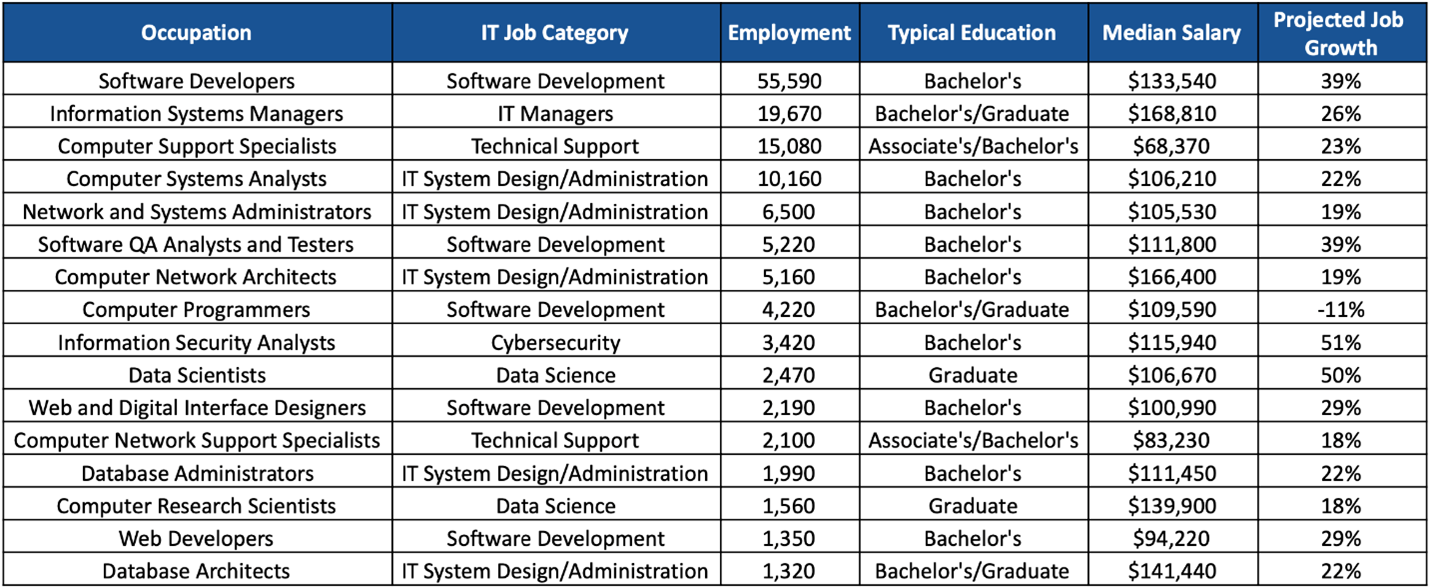Information Technology (IT) is a popular career choice for students, and for good reason. IT jobs are among the highest paid for newly minted college graduates, and job openings are plentiful. Within IT there is a wide range of occupations, with varying educational paths to prepare for them. Most IT occupations, but not all, favor candidates with a four-year college degree. Students don’t need to decide which type of IT job to pursue right away, but they should be aware of the different entry routes to an IT career.
Software Development
Software developer is the most well-known and largest career in the IT field. Close to half of all IT jobs are in software development. Software development jobs are also among the highest paid, with a median salary of $133,500 (see chart below). Jobs in software development include software engineer, mobile application developer, and AI (Artificial Intelligence) developer. These professionals write and maintain software programs for a variety of industries. Students interested in pursuing a career in software development typically major in Computer Science with a focus on programming languages and frameworks.
Information System Design and Administration
This category includes a broad range of jobs involved in designing and maintaining an organization’s information system. Jobs include database architects and administrators, computer and network system architects, and network and system administrators. This category also includes system analysts, who examine how computers and software are used in a company and come up with plans to improve them. Students interested in careers such as systems analysts that combine business and IT skills can opt to major in Management Information Systems (MIS) instead of Computer Science.
Data Science and Business Analytics
There is a growing demand for analysts to help organizations make sense of the huge volumes of data they are collecting. Data Scientists analyze large and complex datasets to extract valuable insights and build predictive models to inform business decisions. Business Intelligence Analysts focus on analyzing and creating easy-to-understand visualizations of existing data to help business managers track performance and make data-driven decisions. An increasing number of colleges are offering undergraduate majors and concentrations in Data Science. Business data analysis and visualization skills are often taught in courses offered by a college’s business program.
Cybersecurity
There is also a growing need for analysts and engineers who specialize in protecting computer systems and networks from cyber-attacks. Several colleges offer a Cybersecurity concentration within their Computer Science department.
Technical Support
Computer Support Specialists is one of the largest job categories within the IT field. Support specialists provide assistance to users who are experiencing computer-related problems. Network support specialists help maintain and troubleshoot a company’s network system. Unlike most jobs in the IT field, which favor candidates with a bachelor’s degree, many entry-level computer support positions are open to those who complete a community college degree or community-based training program in computer and network support.
The chart below, with data retrieved from NextGen Talent’s “Where are the Well-Paying Jobs?” Local Labor Market Literacy Tool, show the median salary and projected job growth for different careers within the IT field. You’ll also find the typical education required for each one. For more information on jobs within the IT sector, create an account in MEFA Pathway to search for careers.














